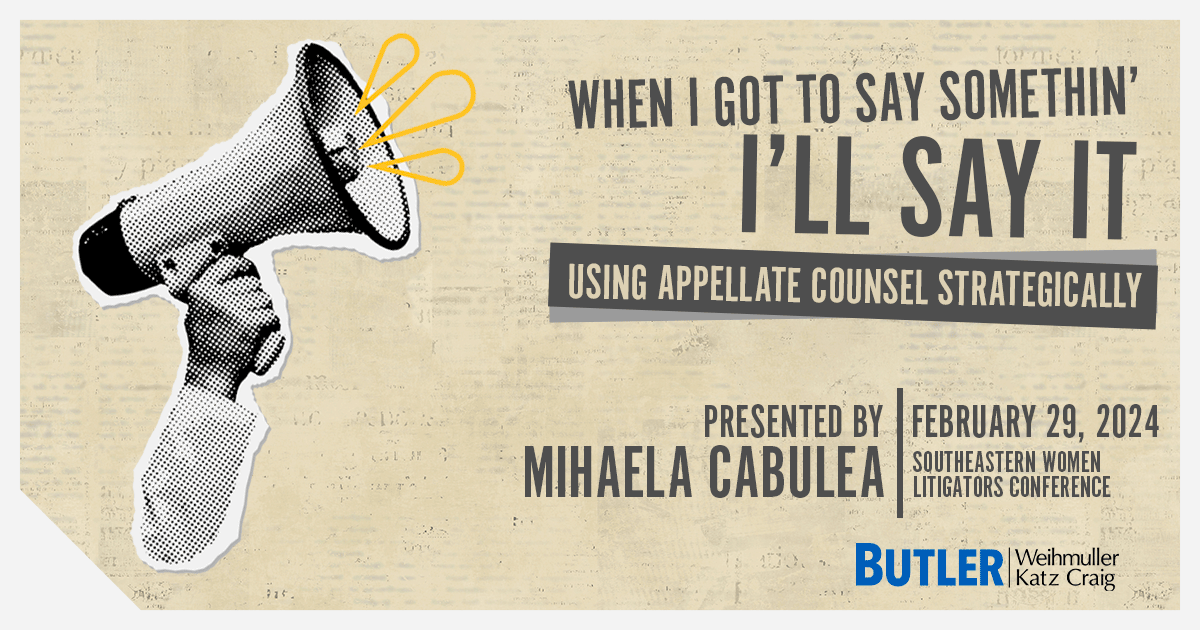
When I Got to Say Somethin’, I’ll Say It: Using Appellate Counsel Strategically
By Mihaela Cabulea | Events
February 27, 2024
Few things play a more sizable factor in litigation than attorney’s fees. They incentivize suing as much as they do settling. The prospect of liability for the other side’s fees is a long shadow cast by every case, whether it basks in the sun of contract, tort, or loftier constitutional law.
In Safepoint Insurance Company v. Williams, 3D19-2196 (Fla. 3d DCA Nov. 10, 2021), the Third District Court of Appeal recently answered a new question about entitlement to fees under section 768.79, Florida Statutes (2019). The statute entitles a defendant to be paid its attorney’s fees despite losing at trial, so long as it serves an offer of settlement that the plaintiff rejects and the “judgment obtained” by the plaintiff is ultimately 25% less than the settlement amount rejected.
Williams was a run-of-the-mill insurance case, where the insurer denied coverage altogether for the insured’s water damage inside the home due to leakage, and the insured rushed to court seeking $20,449.55 in damages for breach of contract. The insurer offered to settle the matter for $25,000.00, exclusive of attorney’s fees, but the insured rejected the offer. After trial, the insured obtained a judgment of only $3,566.10. Naturally, the insurer moved for an award of attorney’s fees in light of the $20,000 disparity between the offer rejected by the insured and the judgment she ultimately obtained. But the trial court denied the motion.
On appeal, the insured argued that the insurer’s offer was not valid to begin with, since it did not include the exact amount of plaintiff’s attorney’s fees. The Third District Court of Appeal first held the offer valid under the plain language of section 768.79, since none of its strictures require an offer to identify the exact amount of the plaintiff’s attorney’s fees before it can be valid.
The Court then separately analyzed the offer’s validity under what it labeled “evolving Florida jurisprudence,” surveying those cases that have refined the interpretation of section 768.79. It relied on and adopted the “White formula” (owing its name to White v. Steak & Ale of Fla., Inc., 816 So. 2d 546, 550 (Fla. 2002)). The Court recognized that a trial court must consider the plaintiff’s attorney’s fees (accrued before the rejected settlement offer is made) in ascertaining the “judgment” later obtained, against which the offer should be measured in determining the 25% difference, but a defendant need not. A defendant may choose, but is not required, to include the amount for such fees in its offer of settlement. The Court also noted that, “no Florida court has held that the plaintiff’s reasonable pre-offer attorneys’ fees must be quantified and included in the total amount of the proposal in order to create a valid offer of judgment.” It chose not to be the first. And it reversed the trial court’s order denying fees, remanding for a proper adjudication of the amount’s reasonableness.
For any further questions, please contact Christian Gonzalez-Rivera.

By Mihaela Cabulea | Events
February 27, 2024


By Carol Rooney | News
November 7, 2023

By Mihaela Cabulea | Events, Webinars
September 18, 2023

By Matthew Lavisky | Events
August 16, 2023